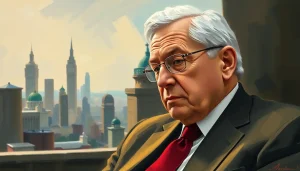Behind every legendary Wall Street titan lies a strategy that transforms markets, and few have mastered the art of private equity quite like the man who once broke the Bank of England. George Soros, a name that echoes through the halls of finance, has left an indelible mark on the world of investing. His journey from humble beginnings to becoming one of the most influential figures in global finance is a testament to his acumen, foresight, and unwavering determination.
Born in Budapest, Hungary, in 1930, Soros survived the Nazi occupation and later fled communist rule to pursue his dreams in the West. His experiences during these tumultuous times shaped his worldview and instilled in him a deep appreciation for open societies and free markets. Little did the world know that this young immigrant would one day become a force to be reckoned with on Wall Street and beyond.
Soros’ entry into the world of finance began with his work at various merchant banks in London. However, it was his move to New York in 1956 that set the stage for his meteoric rise. In 1969, he founded his first hedge fund, Double Eagle, which later evolved into the legendary Quantum Fund. This marked the beginning of Soros Fund Management, a powerhouse that would reshape the landscape of global finance.
For decades, Soros was primarily known for his prowess in currency trading and macroeconomic bets. His most famous (or infamous, depending on your perspective) move came in 1992 when he “broke the Bank of England” by shorting the British pound, netting a cool billion dollars in the process. This audacious bet cemented his reputation as “The Man Who Broke the Bank of England” and showcased his ability to identify and capitalize on market inefficiencies.
However, as the financial world evolved, so did Soros’ strategies. The transition from hedge funds to private equity marked a new chapter in his illustrious career. This shift wasn’t just a change in investment vehicles; it represented a fundamental transformation in how Soros approached wealth creation and market influence.
The Evolution of Soros Private Equity: From Hedge Funds to Long-Term Value Creation
Soros’ foray into private equity wasn’t a sudden leap but a calculated evolution of his investment philosophy. The early private equity investments made by Soros Fund Management were often extensions of strategies employed in their hedge fund operations. These initial forays allowed the firm to dip its toes into longer-term investments while still maintaining the flexibility that had been a hallmark of their success.
As the potential of private equity became increasingly apparent, Soros took a more structured approach. In 1994, Soros Private Equity Partners was established as a dedicated arm of Soros Fund Management. This move signaled a commitment to building a robust private equity portfolio that could complement the firm’s other investment activities.
The establishment of Soros Private Equity Partners marked a significant milestone in the firm’s history. It allowed for a more focused approach to identifying and nurturing long-term investment opportunities. Unlike the rapid-fire trading of currencies and securities that had characterized much of Soros’ earlier career, private equity demanded patience, deep industry knowledge, and a hands-on approach to value creation.
One of the key differences in this new venture was the time horizon. While hedge fund strategies often focused on short to medium-term market movements, private equity investments typically spanned several years. This shift required a different mindset and a new set of skills within the organization.
Notable deals soon followed, showcasing the breadth and ambition of Soros’ private equity arm. One such investment was the acquisition of Bluefly, an online retailer, in 1999. This move, well ahead of the e-commerce boom, demonstrated Soros’ knack for identifying emerging trends and his willingness to bet on the future of technology-driven businesses.
Another significant deal was the investment in Apex Silver Mines, a mining company with operations in Bolivia. This venture highlighted Soros’ global outlook and his willingness to invest in emerging markets and natural resources. While not all investments were runaway successes, they each contributed to the learning and evolution of Soros’ private equity strategy.
Investment Strategy and Philosophy: The Soros Approach to Private Equity
At the heart of Soros’ approach to private equity lies a unique blend of macroeconomic insight, value investing principles, and a keen eye for disruptive trends. Unlike some private equity firms that focus solely on financial engineering or cost-cutting measures, Soros Private Equity Partners has always emphasized long-term value creation through operational improvements and strategic repositioning.
Soros’ investment philosophy in private equity can be distilled into several key principles:
1. Macro-aware investing: Leveraging Soros’ unparalleled understanding of global economic trends to identify sectors and regions poised for growth.
2. Contrarian thinking: Willingness to go against the grain and invest in out-of-favor industries or companies with hidden potential.
3. Operational expertise: Bringing in top-tier management talent and industry experts to drive value creation in portfolio companies.
4. Flexible capital deployment: Utilizing a range of investment structures, from minority stakes to full buyouts, depending on the opportunity.
5. Long-term orientation: Patience to see investments through multiple business cycles, allowing for true transformation and value realization.
The target industries and sectors for Soros Private Equity have been diverse, reflecting the firm’s adaptable approach. However, certain themes have emerged over the years. Technology and telecommunications have been areas of particular interest, aligning with Soros’ belief in the transformative power of innovation. Healthcare, financial services, and natural resources have also featured prominently in the portfolio, often intersecting with broader macroeconomic trends identified by Soros and his team.
Risk management and due diligence processes at Soros Private Equity Partners are rigorous and multifaceted. The firm employs a team of seasoned investment professionals, industry experts, and operational specialists to evaluate potential investments. This comprehensive approach allows for a thorough assessment of not just financial metrics, but also operational capabilities, market positioning, and growth potential.
Moreover, Soros’ emphasis on understanding and anticipating macroeconomic trends plays a crucial role in risk mitigation. By considering how broader economic forces might impact an investment over its lifecycle, the firm aims to position its portfolio to weather various market conditions.
Notable Private Equity Investments: Successes, Challenges, and Lessons Learned
The track record of Soros Private Equity Partners is dotted with both remarkable successes and instructive challenges. One case study that exemplifies the firm’s approach is its investment in Glencore, the Swiss-based commodity trading and mining company.
Soros’ investment in Glencore predated the company’s high-profile IPO in 2011. By identifying the potential in Glencore’s unique business model and global reach, Soros was able to capitalize on the company’s transition from a private partnership to a public entity. This investment not only generated significant returns but also demonstrated Soros’ ability to spot opportunities in complex, globally-oriented businesses.
Another notable investment was in the telecommunications sector, with Soros taking a significant stake in Level 3 Communications. This bet on the future of internet infrastructure proved prescient, as Level 3 became a major player in the backbone of the global internet. While the investment faced challenges during the dot-com bust, Soros’ long-term perspective and additional capital injections ultimately led to a successful outcome.
Not all investments have been unqualified successes, however. The firm’s foray into the energy sector with investments in companies like Petróleo Brasileiro S.A. (Petrobras) faced headwinds due to political instability and corruption scandals in Brazil. These challenges underscored the importance of factoring in geopolitical risks, especially in emerging markets.
When comparing the performance of Soros Private Equity to other major firms, it’s important to note the unique nature of Soros’ approach. Unlike Siris Private Equity, which focuses primarily on technology investments, or Angelo Gordon Private Equity, known for its real estate and credit strategies, Soros’ private equity arm has maintained a more diverse and globally-oriented portfolio. This approach has led to a different risk-return profile, often with greater exposure to macroeconomic trends and emerging markets.
Impact on Global Markets and Economies: The Soros Effect
The influence of Soros’ private equity investments extends far beyond financial returns. In many cases, these investments have had profound effects on industries and economies around the world. For instance, Soros’ investments in Eastern European companies following the fall of the Soviet Union played a role in the region’s economic transformation, providing much-needed capital and expertise to emerging market economies.
In the technology sector, Soros’ investments have often been at the forefront of innovation. By providing capital and strategic guidance to companies in areas like telecommunications, e-commerce, and fintech, Soros Private Equity has helped accelerate the development and adoption of new technologies. This approach stands in contrast to firms like Solaris Private Equity, which focuses more narrowly on the solar energy sector.
The economic effects of Soros’ investments in target countries have been significant and sometimes controversial. In some cases, his investments have been credited with creating jobs, improving infrastructure, and fostering economic growth. However, the scale and influence of his investments have also led to criticism and scrutiny.
Critics have accused Soros of using his financial clout to influence political outcomes or destabilize economies for personal gain. The most famous example is the aforementioned breaking of the Bank of England, which, while legal, raised questions about the power of individual investors to impact national economies. Soros has consistently maintained that his investments are made based on economic principles and a belief in open societies, not political motivations.
It’s worth noting that the impact of Soros’ private equity investments often differs from those of sovereign wealth funds, which engage in private equity with different objectives and constraints. While sovereign wealth funds often prioritize long-term stability and national interests, Soros’ approach has been more dynamic and globally oriented.
Future Outlook for Soros Private Equity: Adapting to a Changing World
As we look to the future of Soros Private Equity, several trends and potential strategies emerge. The firm continues to evolve, adapting to changing market conditions and emerging opportunities. One area of increasing focus is sustainable and impact investing, reflecting a broader shift in the investment world towards considering environmental, social, and governance (ESG) factors.
Soros Fund Management has pledged to allocate significant capital to investments that address climate change and other social issues. This commitment suggests that the private equity arm may increasingly target companies and technologies that offer solutions to global challenges. This approach aligns with the growing emphasis on sustainability seen in firms like Sixth Street Private Equity, which has been active in renewable energy investments.
Another potential area of growth is in digital transformation and the continued evolution of the tech sector. As artificial intelligence, blockchain, and other cutting-edge technologies reshape industries, Soros Private Equity is likely to seek out opportunities to invest in companies at the forefront of these trends. This focus on transformative technologies echoes the approach of firms like Cerberus Private Equity, known for its investments in technology-enabled businesses.
The question of succession planning and long-term vision for Soros Fund Management, including its private equity arm, has been a topic of discussion in financial circles. George Soros, now in his 90s, has taken steps to ensure the continuity of his investment philosophy and philanthropic efforts. In recent years, he has handed over day-to-day management of the firm to a new generation of leaders, including his son Alexander Soros.
This transition raises intriguing questions about the future direction of Soros Private Equity. While the core principles of the Soros investment philosophy are likely to remain intact, new leadership may bring fresh perspectives and strategies to the table. It will be interesting to see how the firm balances its historical strengths in macroeconomic analysis and contrarian thinking with emerging investment trends and technologies.
The Lasting Legacy of Soros in the World of Private Equity
As we reflect on the journey of George Soros from currency speculator to private equity titan, several key lessons emerge for investors and market observers. First and foremost is the importance of adaptability. Soros’ transition from hedge funds to private equity demonstrates the value of evolving one’s strategy to match changing market conditions and personal goals.
Secondly, Soros’ approach underscores the power of combining macroeconomic insights with detailed, company-level analysis. This holistic view of investments, considering both the forest and the trees, has been a cornerstone of his success in private equity. It’s an approach that differs from more narrowly focused firms like 3G Private Equity, known for its focus on operational efficiency in consumer goods companies.
Another key lesson is the value of contrarian thinking and the courage to act on one’s convictions. Soros has never been afraid to go against the grain, whether in his currency trades or his private equity investments. This willingness to take calculated risks based on thorough analysis has been a defining characteristic of his investment career.
The impact of Soros on the private equity landscape extends beyond his individual investments. His emphasis on understanding and leveraging macroeconomic trends has influenced how many in the industry approach deal-making and portfolio management. Furthermore, his commitment to using his wealth and influence to promote open societies and address global challenges has set a precedent for socially conscious investing in the private equity world.
As the private equity industry continues to evolve, with firms like Transom Private Equity exploring new strategies and sectors, the legacy of George Soros serves as both an inspiration and a case study. His journey from hedge fund manager to private equity innovator illustrates the potential for reinvention and the enduring value of a global, macro-aware investment approach.
In conclusion, the story of Soros Private Equity is more than just a tale of financial success. It’s a narrative about the power of adaptability, the importance of long-term thinking, and the potential for private capital to shape industries and economies. As we look to the future, the principles and strategies pioneered by George Soros will undoubtedly continue to influence the world of private equity and beyond, leaving a lasting imprint on the global financial landscape.
References:
1. Kaufman, M. T. (2002). Soros: The Life and Times of a Messianic Billionaire. Alfred A. Knopf.
2. Soros, G. (2003). The Alchemy of Finance. John Wiley & Sons.
3. Steinmetz, G. (2018). “George Soros Transfers $18 Billion to His Foundation, Creating an Instant Giant”. The Wall Street Journal. https://www.wsj.com/articles/george-soros-transfers-18-billion-to-his-foundation-creating-an-instant-giant-1508252926
4. Mallaby, S. (2010). More Money Than God: Hedge Funds and the Making of a New Elite. Penguin Press.
5. Soros Fund Management LLC. (2021). “Our Story”. https://www.sorosfundmanagement.com/our-story/
6. Bloomberg. (2021). “Company Overview of Soros Fund Management LLC”.
7. Financial Times. (2019). “George Soros: ‘I’m not a tax evader'”. https://www.ft.com/content/7c7ba87e-86bc-11e9-a028-86cea8523dc2
8. The Economist. (2018). “George Soros, the man who broke the Bank of England, worries about the fate of the EU”.
9. Forbes. (2021). “George Soros”. https://www.forbes.com/profile/george-soros/
10. Open Society Foundations. (2021). “George Soros”. https://www.opensocietyfoundations.org/george-soros












Would you like to add any comments? (optional)